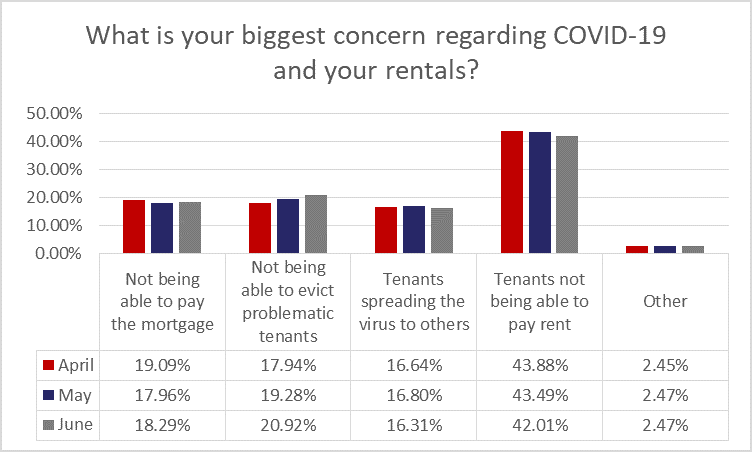Are Tenants Catching Up on Rent? The June Numbers Are In!
For the third month in a row, the American Apartment Owners Association surveyed over 1,000 landlords across to country to find out whether their tenants have requested a deferral, whether they are willing to help tenants, and how prepared they feel in case a tenant falls ill.
While most tenants in need have already spent their April stimulus checks, many are still receiving unemployment benefits on a weekly basis providing some financial stability. In addition, economies even in the strictest states have started to open up again, offering more employment opportunities. The results this month reflect stabilizing conditions and we are optimistic to see improvements over the summer.
Few Additional Tenants Requested a Rent Deferral
The percentage of landlords who had at least one tenant ask for a rent deferral remained almost unchanged. This could be because most tenants who need assistance requested it early on in the pandemic likely for at least a few months. There may be fewer additional tenants who are requesting deferrals now.
Landlord Are Still Willing to Work with Tenants
Although there may not be many additional tenants asking for deferrals, landlords are still concerned about whether tenants they helped will be capable of paying them back rent. Repayment rates remain to be seen, but it is clear landlords are still willing to work with tenants rather than resort to eviction.
Landlords Still Don’t Feel Prepared for a Coronavirus Outbreak
Perhaps due to changes in the news cycle surrounding the spread of coronavirus, landlords are only a little more confident today than they were three months ago regarding how to handle an ill tenant in a multifamily building. There is still uncertainty about how the virus is spread and what a landlord’s duty is to prevent the spread especially when it comes to showing vacant properties and cleaning high touch common areas.
Landlords Are More Worried About Evicting Problematic Tenants than Before
Tenants not being able to pay rent has been a number one concern throughout these last three months, but we saw an increase in concern regarding evictions. This could be because courts have started to open, but in a very limited capacity in most areas, making landlords wonder if their case would be brought to trial in a timely fashion. Although courts have made exceptions for nuisance, criminal activity, and other severe lease violations, nonpayment of rent may be slower to solve in court. Some landlords feel stuck with leases they would have terminated under normal circumstances but now cannot get out of due to court limitations.
Conclusions
As the economy begins to reopen, many tenants will find themselves in a more optimal position but could still struggle to catch up on unpaid rent their landlord deferred. Furthermore, landlords worry that it may be difficult to end problematic tenancies. Although landlords in many states are now able to proceed with eviction trials, many may find themselves at the end of a long line. We still recommend working out a reasonable repayment plan with tenants who are following all other lease terms. Consult with an attorney to find out if taking the matter to court is worth the cost and hassle and consider using LeaseGuarantee when filling a vacancy to protect your rental income in the future.



















 Accessibility
Accessibility